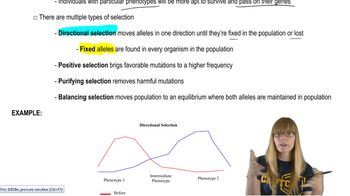Here are the essential concepts you must grasp in order to answer the question correctly.
Natural Selection
Natural selection is a fundamental mechanism of evolution, proposed by Charles Darwin. It describes the process by which individuals with advantageous traits are more likely to survive and reproduce, passing those traits to the next generation. Over time, this leads to the adaptation of species to their environments, as beneficial traits become more common within a population.
Recommended video:
Variation
Variation refers to the differences in traits among individuals within a population. These differences can be due to genetic mutations, environmental factors, or a combination of both. Variation is crucial for natural selection, as it provides the raw material upon which selective pressures act, allowing certain traits to be favored over others.
Recommended video:
Survival of the Fittest
The phrase 'survival of the fittest' encapsulates the idea that individuals best adapted to their environment are more likely to survive and reproduce. 'Fittest' does not necessarily mean the strongest; it refers to the best-suited individuals for a specific environment. This concept emphasizes the role of adaptation in the evolutionary process, highlighting how certain traits enhance an organism's chances of survival.
Recommended video:
 Verified step by step guidance
Verified step by step guidance Verified video answer for a similar problem:
Verified video answer for a similar problem:

